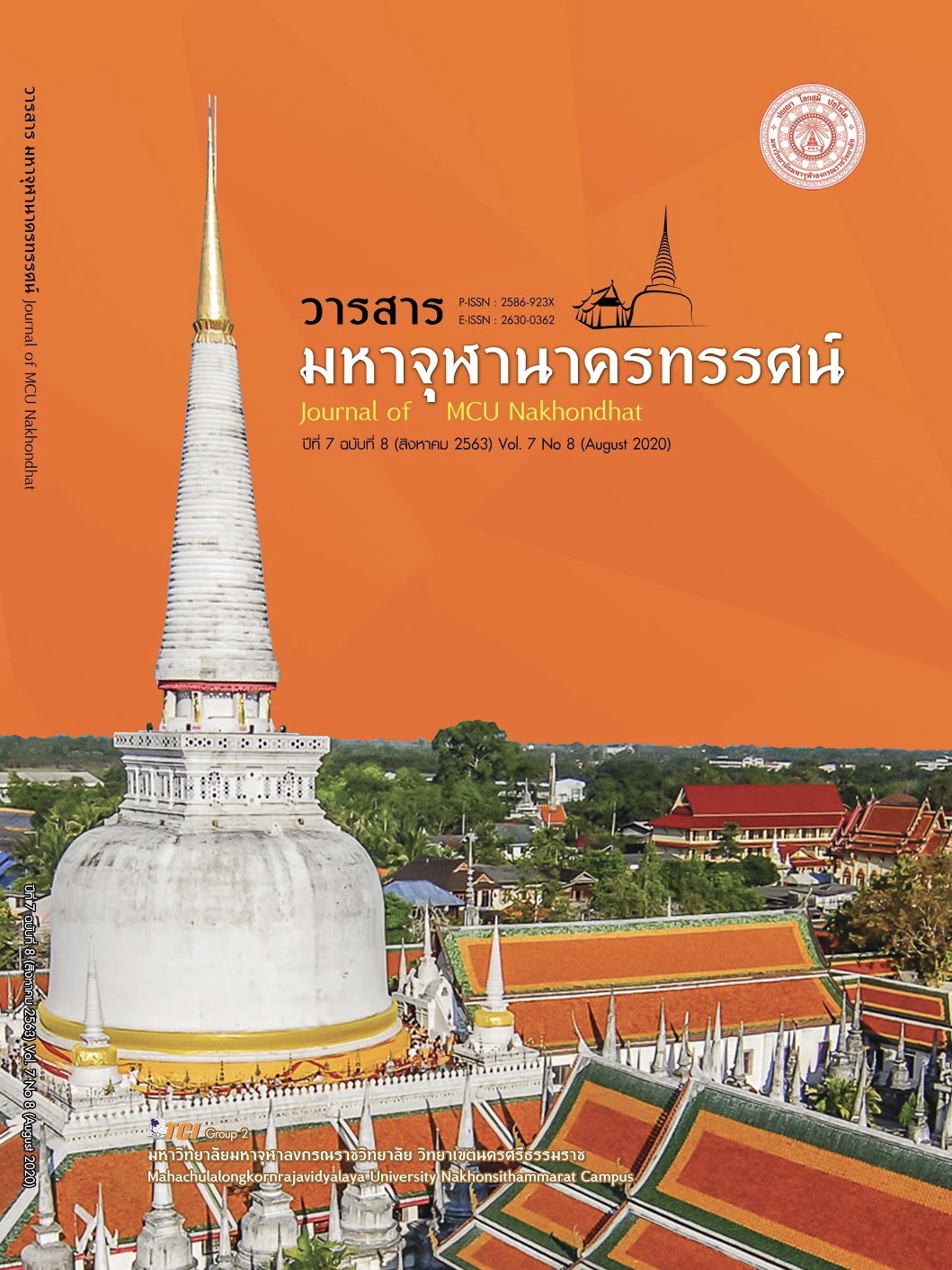FAMILY COMMUNICATION AND PROBLEM SOLVING FOR MUSLIM TEENAGERS
Main Article Content
Abstract
This academic article aims to see the importance of family communication. The target is a Muslim teenager who is considered one of the important population groups of the nation and have to solve problems together. Muslims to be a society with a culture that is different from the Thai Buddhist society. They have traditional way of life. Some Muslims still have an attitude that blocks sex. Therefore, as a guideline to solve the problem of Muslim adolescents Effective communication between parents and teenagers is of paramount importance. Parents are an important channel to help support and solve problems that may occur to youth. Drugs and other problems concerning teenagers' sex education were the most serious problems for which parents were deeply worried. Solutions should start at home. Parents construct a loving, warm, and understanding family, take care of their children including friends of their children, and cooperate with school, community, and society to solve problems. Parents sought information about sex education from TV sex education programs, consult with peers, doctor/expert, and read sex education text.The appropriate and persuasive teaching/communication personnels were parents/close elatives/teachers/doctors/experts. The desired and required teaching subject matters were sex education in general covering the early teen to young adult.
Article Details
References
มุหัมมัด อิบนุญะมีล ไซนู. (2557). วิธีเลี้ยงลูกให้เป็นคนดี. แปลโดย มุหัมมัด เหมอนุกูล. (พิมพ์ครั้งที่ 6). กรุงเทพมหานคร: นัทชาพริ้นติ้ง.
ยูซุฟ อัลเกาะเราะฎอวีย์. (2557). นักดาอีย์กับบางส่วนที่เลือนหาย. แปลโดย มุดัรฺริส อบูบักรู. กรุงเทพมหานคร: นัตวิดาการพิมพ์.
วิศนีย์ บุญมั่น. (2550). ผลของโปรแกรมการมีส่วนร่วมต่อการสื่อสารเรื่องเพศระหว่างบิดาและบุตรชายวัยรุ่น. ใน วิทยานิพนธ์วิทยาศาสตรมหาบัณฑิต สาขาพยาบาลสาธารณสุข. มหาวิทยาลัยมหิดล.
สำนักงานคณะกรรมการสิทธิมนุษยชนแห่งชาติ. (2559). เสรีภาพในการถือศาสนา เสรีภาพในการปฏิบัติตามศาสนธรรม ศาสนบัญญัติ และการเลือกปฏิบัติที่ไม่เป็นธรรม กรณีการห้ามสตรีที่นับถือศาสนาอิสลามสวมฮิญาบ. กรุงเทพมหานคร: ปกเกล้า.
สำนักอนามัยการเจริญพันธุ์กรมอนามัย กระทรวงสาธารณสุข. (2557). รายงานการศึกษาวิจัยเรื่องการสื่อสารเรื่องเพศในครอบครัวไทย. นนทบุรี: ชุมนุมสหกรณ์การเกษตรแห่งประเทศไทย.
สุรีย์พร กฤษเจริญ และกัญจนี พลอินทร์. (2551). การสอนเรื่องเพศของพ่อแม่และความต้องการเรียนรู้เรื่องเพศของลูก. สงขลานครินทร์เวชสาร, 26(1), 61-70.
อับดุรเราะห์มาน อัชชีหะฮฺ. (2553). คุณลักษณะเฉพาะของศาสนาอิสลาม (3). เรียกใช้เมื่อ 25 มิถุนายน 2563 จาก https://islamhouse.com/th/articles/321594/
อาภาพร เผ่าวัฒนา. (2553). การสั่งสอนอบรมลูกเชิงบวก. เรียกใช้เมื่อ 25 มิถุนายน 2563 จาก https://www.thaihealth.or.th/Content/15802-การอบรมสั่งสอนลูกเชิงบวก.html
Burgess, V. et al. (2005). Improving Comfort about Sex Communication Between Parents and Their Adolescents : Practice-Based Research Within a Teen Sexuailty Group. Brief Treatment and Crisis Intervention, 5(1), 379-390.
Kirby, J. et al. (2010). Sexual Health Among Young People in Scotland. Child and Adolescent Health Research Unit, University of Edinburgh. Retrieved June 25, 2020, from www.cahru.org/content/04-publications/03-briefing-papers-and-factsheets/briefingpaper_18.pdf
Ramos, G. & Bouris, A. (2008). Parent-Adolescent Communication about Sex in Latino Families: A Guide for Practitioners. The National Campaign To Prevent Teen and Unplanned Pregnancy. Retrieved June 25, 2020, from https://www.hennepinhealthcare.org/wp-content/uploads/2018/09/apt-parent-adolescent-comm-sex.pdf
Siddiqui, B. H. (1991). Knowledge: An Islamic Perspective. Pakistan: Islamic Research Institute.
Wilson, E. K. & Grad, J. C. (2010). Parents' Perspectives on Talking to Preteenage Children about Sex. Perspectives on Sexual and Reproductive Health, 42(1), 56-63.


